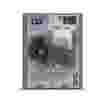How Screw Blower Technology Works
Screw blower technology is based on the principle of positive displacement, using two intermeshing screw rotors that rotate in opposite directions inside a precisely engineered casing. As the rotors turn, air or gas is trapped in the cavities formed between the screw profiles and the housing, then transported axially from the inlet to the outlet.
During this process, the volume of the trapped gas remains almost constant, which allows the screw blower to deliver a continuous and stable airflow. Unlike compression systems, the goal of a screw blower is not to significantly increase pressure, but to move large volumes of air or gas efficiently at low to medium pressure levels, with minimal pulsation.
One of the key characteristics of screw blower technology is its smooth, pulse-free operation. The continuous geometry of the screw rotors eliminates the cyclic pressure fluctuations typically associated with traditional lobe blowers. This results in reduced vibration, lower noise levels and improved mechanical stability throughout the system.
Screw blowers are commonly designed for oil-free operation, meaning there is no lubrication within the compression chamber. This ensures clean airflow and makes the technology suitable for applications where air or gas purity is critical. External synchronization systems maintain precise rotor timing, preventing internal contact and reducing mechanical wear.
Thanks to these operating principles, screw blower technology offers high reliability in continuous-duty industrial applications. Stable airflow, reduced mechanical stress and controlled operating temperatures contribute to long service life, consistent performance and optimised energy efficiency over extended operating periods.
At Pedro Gil, screw blower technology is engineered to meet the demands of industrial environments where process stability, efficiency and long-term operational reliability are essential.




